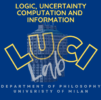LOGIC
At LUCI Lab, logic is primarily a research mindset. We are inspired by, and seek to contribute to, the most pressing questions arising in science and technology. We are extremely lucky witnessing the coming of age of data-intensive and AI-driven science. They are redefining the very meaning of scientific knowledge, how it is produced, and how it is transferred to society. At LUCI Lab, we ask what should follow from this kind of knowledge while it is still in the making.
Data-driven scientific knowledge is at the heart of the interaction between humans and AI-systems. So we develop logics which aim to play a key role in hybrid- and human-centered AI. In this context we ask what it takes for data-driven hypotheses to yield valid scientific inferences. And in seamless connection with this methodological question, we ask under what conditions should we trust machine learning algorithms to produce valid outputs.
Addressing those questions requires developing logics in continuity with three central concepts of science and technology: uncertainty, computation and information.
UNCERTAINTY
Data-intensive and AI-driven science make heavy use of statistical methods. It is therefore intrinsically stochastic. However, the concept of logical consequence which has dominated logical research in the past century, is ill-suited to define valid inference from uncertain premisses. Extending logic to encompass uncertainty has been at the forefront of research in AI and epistemology for the past two decades, but the combination of logic and probability is far from new. It was in fact a key feature in the methodology set forth by George Boole when he invented modern logic with his attempt to endow traditional (Greek) logic with the language and methodology of mathematics. Against the socio-technical and cultural background of the industrial revolution, Boole set a radically new goal for logic: the identification of a “general method’’ to solve mechanically all reasoning problems, including those with uncertain premisses.
At the LUCI Lab we stand on the shoulders of Boole and ask what general criteria of validity can be put forward to allow humans, institutions, and machines to make inferences from uncertain premisses. To do so we apply the most advanced tools and techniques from quantitative and qualitative representations of uncertainty. Not only our results contribute to shaping the methodology of the science to come, but in doing so, contribute putting again the logical mindset at the heart of the scientific method.
COMPUTATION
In the hands of Frege, Russel and then Hilbert, the scope of logic was circumscribed to mathematical proof, or as it was called back then, metamathematics. This restriction was instrumental to the glorious success obtained by logicians during the first half of the Twentieth century. As that golden age eventually came to a stop, one of its offsprings – computer science – quickly ignited the socio-technological revolution which led to our present information society. As many of Alan Turing’s visionary ideas on mechanical intelligence became mass-produced gadgets, we all carry in our pockets, a new way of doing logic emerged in continuity with computation.
Al LUCI Lab we build directly on this recent logical tradition and bring the most advanced proof-theoretic and computational-logic tools and techniques to bear on technological problems of key societal impact, like bias detection in machine learning algorithms.
INFORMATION
Seeing reasoning as information-processing was one of the key drivers in the coming of age of the digital era. During the second half of the past century logic has put forward a variety of tools and techniques to formalise what follows from information that a reasoning agent may or may not have, or information that an agent may (not) have about other reasoning agents it is interacting with. However, most well-known systems make unreasonable demands on the resources of the reasoning agents they formalise. Whilst this is fine when logic is investigated in a purely formal fashion, it is a clear limitation when logic is motivated by the goal of defining the validity of inferences that realistic, i.e. resource-bounded, agents can perform.
Al LUCI Lab we investigate the deep connection between the information reasoning agents possess and the logical inferences they, both individually and as groups, can be reasonably expected to be able to perform based on such information.
